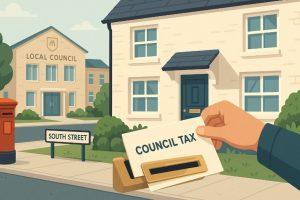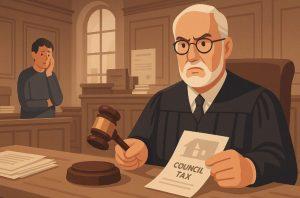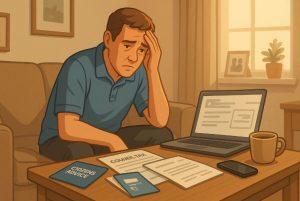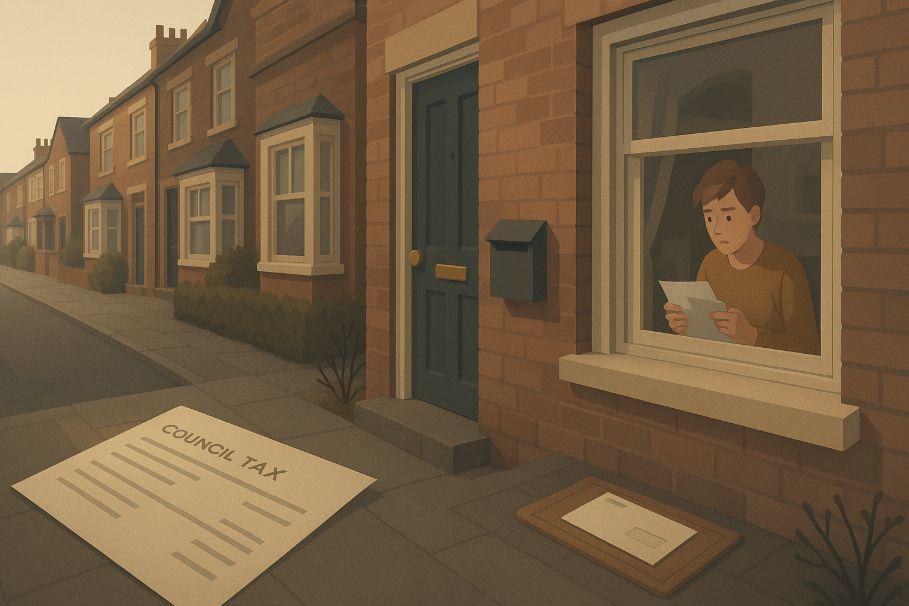In the United Kingdom, council tax is a legal obligation for residents, and it funds many of the local services that communities depend on such as rubbish collection, emergency services, and education.
Despite its widespread application, confusion often arises about what happens if someone stops paying, whether they can delay payments, and how long they can go without facing legal consequences.
This blog explores how long someone can stay without paying council tax in the UK, particularly in London, and provides a clear overview of the rules, consequences, and options available for those who may be struggling to keep up.
What Is Council Tax in the UK?

Council tax is a local taxation system introduced in 1993 to replace the Community Charge, also known as the Poll Tax. It applies to residential properties and is collected by local authorities across England, Scotland, and Wales. In most cases, one person in a household is designated as the liable party for the payment. This is often the tenant or homeowner who occupies the property.
In shared homes or houses of multiple occupation (HMOs), the person highest in the tenancy hierarchy becomes responsible, although landlords may be liable in some cases especially when a property is vacant.
While most adults are required to pay council tax, there are exceptions. For example, full-time students are usually exempt, and people with severe mental impairments can also qualify for exemptions. Discounts are available too, such as the 25% single person discount for those living alone.
Are There Any Legal Time Limits on Unpaid Council Tax?
The timeframe in which a council can recover unpaid council tax is guided by the Limitations Act 1980. In general, councils have up to six years to pursue unpaid tax before the debt becomes statute-barred. However, this timeline changes dramatically once the council applies for and is granted a Liability Order through the Magistrates’ Court.
A Liability Order gives the council extended powers to pursue the debt through enforcement agents or direct deductions from income, which means they are no longer restricted by the six-year period. In practice, this means councils can continue to collect the debt indefinitely, particularly if they take enforcement action early on.
So, while there may be a six-year initial limitation, this rarely applies if councils act promptly.
What Happens If Someone Doesn’t Pay Council Tax on Time?
The process of dealing with council tax arrears begins quickly. When a payment is missed, the local authority usually sends a reminder notice after about two weeks. If payment is not made within seven days of this notice, the taxpayer loses the right to pay in instalments and must instead pay the entire year’s tax in full.
If this demand is also ignored, the council will escalate the matter by issuing a final notice, and then apply for a court summons. The court will generally grant a Liability Order, which legally confirms that the person owes the debt and gives the council the authority to enforce collection. This is often accompanied by additional costs, increasing the financial burden.
Councils are not obligated to wait long before taking action, and enforcement processes can begin within a few months of non-payment. Ignoring council tax bills can lead to spiralling debt due to added fees and court charges.
Can You Go to Jail for Not Paying Council Tax in the UK?

Yes, although rare, imprisonment is possible for non-payment of council tax but only in specific circumstances. It typically occurs when someone has the means to pay but has willfully refused to do so or has shown culpable neglect.
If all other collection methods fail, the local authority can request a committal hearing in the Magistrates’ Court. At this stage, the court will assess whether the non-payment was deliberate. If the magistrates find that the person has deliberately avoided payment, they can issue a prison sentence of up to 90 days.
However, this is viewed as a last resort. Courts generally prefer repayment arrangements and alternative enforcement actions before considering jail time.
How Do Local Councils Recover Council Tax Debt?
Local councils have robust enforcement powers when it comes to recovering unpaid council tax. Once a Liability Order is in place, they can take several actions to ensure the debt is collected.
The most common method is through deductions directly from wages or benefits. If this is not possible, they may employ enforcement agents, commonly known as bailiffs. These agents can visit the property, seize non-essential goods, and sell them to cover the outstanding amount.
If the debt is substantial and remains unpaid, the council can apply for a Charging Order against the property, or in extreme cases, initiate bankruptcy proceedings. These measures are legally supported and can significantly impact a person’s financial situation.
Are There Any Valid Reasons or Exemptions for Not Paying Council Tax?
Yes, several exemptions and discounts are available under UK law, and individuals should explore these options if they believe they are eligible.
People who are full-time students, under the age of 18, or have a severe mental impairment may not have to pay any council tax. Additionally, properties that are unoccupied, undergoing structural repair, or under probate may also be exempt temporarily.
Discounts are available for single occupancy households, carers, apprentices, and some low-income households. In London boroughs, local councils also offer Council Tax Reduction schemes, which are means-tested and help reduce the amount owed based on individual circumstances.
It’s important to apply for these exemptions proactively, as councils rarely apply them automatically.
Is It Possible to Delay or Pause Council Tax Payments Legally?

Yes, in many cases, councils are willing to be flexible particularly when someone is facing financial hardship. If a person contacts the council early, they can often negotiate a payment holiday or an extended instalment plan that spreads the remaining balance across more months.
Under normal circumstances, council tax is paid over ten months, but some councils allow for 12-month arrangements to make monthly payments more manageable.
Those in particularly difficult situations can apply for the Council Tax Reduction Scheme, which may significantly lower their bill or, in some cases, eliminate it altogether.
How Can Someone Set Up a Council Tax Payment Plan or Debt Arrangement?
Setting up a payment plan is a relatively simple process. It begins by contacting the local authority’s revenue and benefits department. Individuals should be prepared to provide details about their income, expenses, and reasons for hardship.
If the council agrees to a payment plan, it’s important to stick to the agreed schedule. Failure to do so could lead to the cancellation of the arrangement and a return to the formal enforcement process.
Organisations like StepChange, Citizens Advice, and National Debtline also offer free guidance and can help negotiate with the council on behalf of the debtor. They are well-versed in the system and can suggest the most suitable repayment options based on the individual’s financial situation.
How Much Time Does a Council Give Before Involving Bailiffs?
Once a Liability Order is issued, the council is not required to wait long before taking further action. In fact, they can instruct bailiffs to collect the debt after giving just seven clear days’ notice via an Enforcement Notice.
If the individual does not respond or fails to make payment arrangements within that period, bailiffs are legally entitled to visit the property. These visits come with additional fees often beginning with a £75 charge for the notice, followed by further charges for visits and potential removal of possessions.
The process can escalate quickly, so responding to enforcement notices promptly is crucial to avoid mounting costs and distress.
What Should Someone Do If They Can’t Afford Council Tax Right Now?

The most important step anyone in this situation can take is to act early. Ignoring council tax bills will only make the situation worse. Instead, individuals should contact their local authority as soon as they realise they’re struggling to pay.
Most councils have procedures in place for helping residents who are facing short-term or long-term financial hardship. These can include reductions, revised payment schedules, or referrals to external advice agencies.
It’s also beneficial to seek help from trusted organisations like Citizens Advice or StepChange, which offer confidential, free advice on managing debt and dealing with local authorities.
What are the Real-Life Examples of Council Tax Debt Recovery in the UK?
In one London case, a single parent who fell behind on council tax due to job loss was able to negotiate a repayment plan of £20 per month. With the help of StepChange, she avoided court action and cleared her arrears within a year.
In another instance, an elderly couple in Croydon were issued a bailiff notice despite having serious medical issues. With assistance from Citizens Advice and supporting documents from their GP, the council agreed to halt enforcement and offered a partial reduction.
These examples demonstrate that communication and documentation are vital when dealing with council tax debt.
Conclusion
While someone might technically delay paying council tax for a few weeks or even months, the consequences of long-term non-payment can be severe. Legal action, enforcement agents, and even imprisonment in rare cases are all possible outcomes.
The good news is that local councils are often open to negotiation and support, especially when contacted early. By understanding the process, exploring exemptions, and seeking help when needed, residents can avoid the stress and financial burden of enforcement action.
Council tax is not optional but the support systems in place mean that nobody should have to face the issue alone.
FAQs
How long can a council pursue unpaid council tax?
Local councils have six years to recover the debt, but this can extend indefinitely if they secure a Liability Order.
Are students exempt from council tax in the UK?
Yes. Full-time students living exclusively with other students are exempt from paying council tax.
Will council tax arrears impact my credit score?
Not directly. However, if legal action is taken and enforcement occurs, it may appear on public financial records.
Can bailiffs take possessions for council tax debt?
Yes, they can seize non-essential items to cover the debt but must follow legal procedures and cannot take basic living essentials.
Is council tax included in rental agreements?
In some rental agreements, especially in HMOs, landlords pay the council tax and include it in the rent. Always check your contract.
How do I apply for a council tax exemption in London?
You must contact your borough council and provide evidence supporting your exemption, such as a student certificate or medical documents.
Can unpaid council tax lead to bankruptcy?
In extreme cases, yes. If the debt exceeds £5,000 and all other options fail, a council may apply for a bankruptcy order.









Leave feedback about this